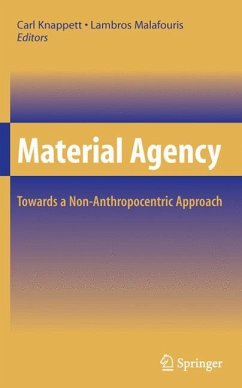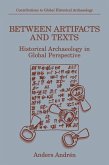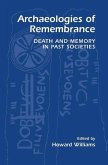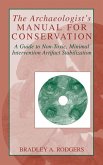Thus far an 'agent' in the social sciences has always meant someone whose actions bring about change. In this volume, the editors challenge this position and examine the possibility that agency is not a solely human property. Instead, this collection of archaeologists, anthropologists, sociologists and other social scientists explores the symbiotic relationships between humans and material entities (a key opening a door, a speed bump raising a car) as they engage with one another.
Agency is a key theme that cross-cuts a wide raft of disciplines in the humanities, social sciences and beyond; yet it is invariably discussed separately behind closed disciplinary doors.
Within archaeology, agency has been characterized as a uniquely human attribute, and a means of incorporating individual intentionality into theoretical discourse. In other domains, however, notions of non-human and 'material' agency have been finding currency, and it is our aim to introduce some of these themes into archaeology and develop a non-anthropocentric approach to agency.
It is anticipated that such a perspective will not only help us achieve more convincing interpretations of the past, giving a more active role to material culture, but also throw new light on the changing role of artifacts in the present and the future.
This book is a groundbreaking attempt to address questions of non-human and material agency from a wide range of perspectives and disciplines: archaeology, anthropology, sociology, cognitive science, philosophy, and economics. The editors and authors demostrate that a distributed, relational approach to agency, incorporating both humans and artifacts, has important ramifications for how we understand material culture.
Agency is a key theme that cross-cuts a wide raft of disciplines in the humanities, social sciences and beyond; yet it is invariably discussed separately behind closed disciplinary doors.
Within archaeology, agency has been characterized as a uniquely human attribute, and a means of incorporating individual intentionality into theoretical discourse. In other domains, however, notions of non-human and 'material' agency have been finding currency, and it is our aim to introduce some of these themes into archaeology and develop a non-anthropocentric approach to agency.
It is anticipated that such a perspective will not only help us achieve more convincing interpretations of the past, giving a more active role to material culture, but also throw new light on the changing role of artifacts in the present and the future.
This book is a groundbreaking attempt to address questions of non-human and material agency from a wide range of perspectives and disciplines: archaeology, anthropology, sociology, cognitive science, philosophy, and economics. The editors and authors demostrate that a distributed, relational approach to agency, incorporating both humans and artifacts, has important ramifications for how we understand material culture.








